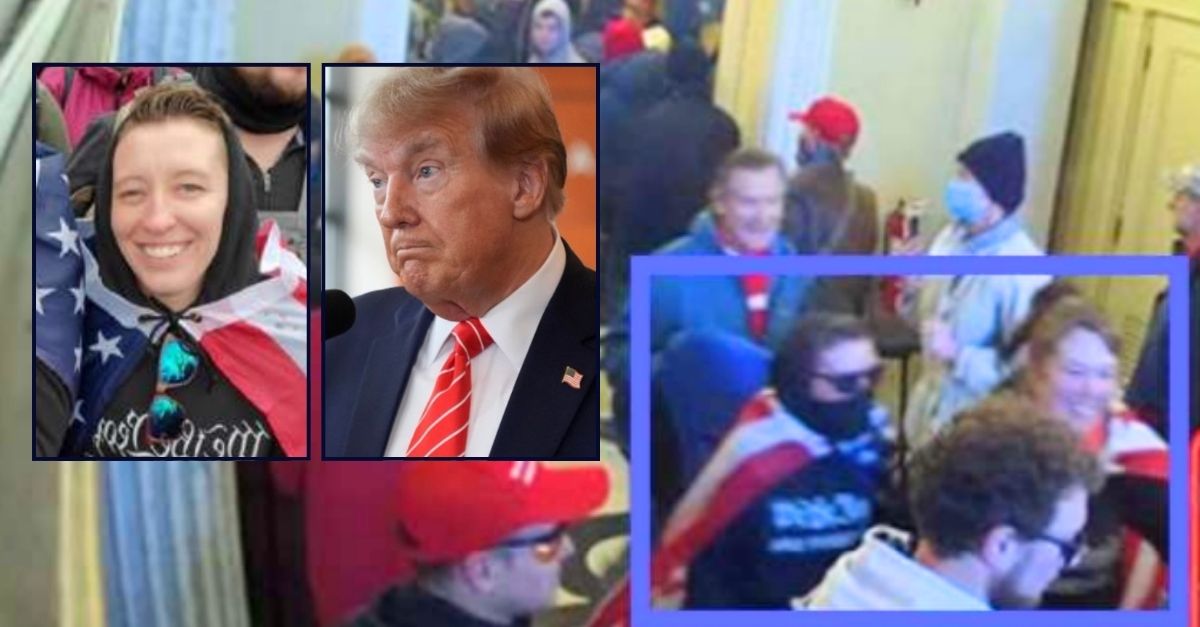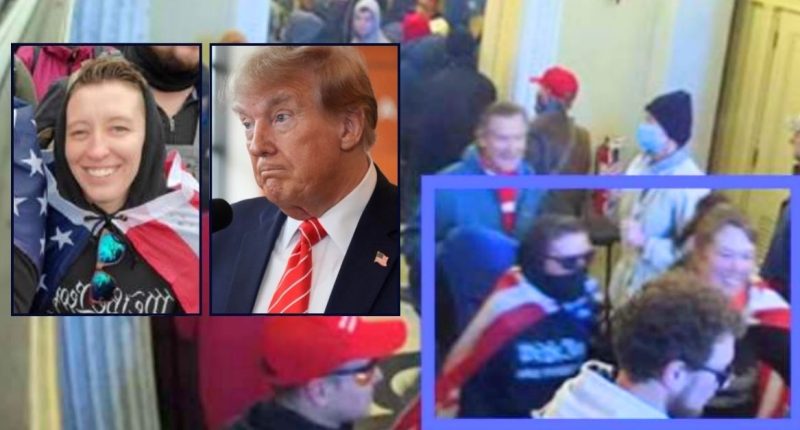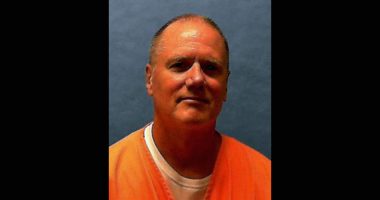
Background: Kirstyn Niemela in screengrabs from footage captured inside the U.S. Capitol (Department of Justice). Left inset: Kirstyn Niemela (DOJ). Right inset: Donald Trump speaks after meeting with members of the International Brotherhood of Teamsters at their headquarters on Jan. 31, 2024, in Washington (AP Photo/Andrew Harnik).
A Jan. 6 rioter from New Hampshire who was pardoned by President Donald Trump on Monday night is now calling for “investigations and compensation” for defendants for the prison time they served and for “defamation of character and slander.”
Kirstyn Niemela, a construction worker from Hudson, New Hampshire, spent eight months behind bars at a federal prison for storming the U.S. Capitol on Jan. 6, 2021, with her then-girlfriend. Witnesses identified Niemela from video captured by others in the crowd that day, during which Niemela can be seen breaking a window and claiming to be part of the Proud Boys extremist group, the Department of Justice alleged.
“There is something big coming,” Niemela can be heard saying in one video, according to her criminal complaint. “The whole nation will watch it happen.”
Niemela was on federal probation when Trump’s pardons came down Monday. She spoke to The Boston Globe after hearing the news, saying it’s been “a long four years” and that she was unsure what a pardon meant exactly.
“I do believe it should be a pardon of innocence,” Niemela said. “And there should be investigations and compensation for my prison sentence and for defamation of character and slander.”
Niemela told the Globe that the allegations from the DOJ about her claiming to be a Proud Boys member and causing damage were untrue. “I’m not a Proud Boy. I’m a gay conservative woman,” she said. “And, I did not break a window.”
She also said that being arrested and convicted ruined relationships she had with people who were close to her. It has also allegedly led to her being unemployed.
“I lost friends and family, and I haven’t been able to find a job,” Niemela said, blasting her situation and the reporting around the Jan. 6 attack as “lies by the mainstream media.”
Asked what she ultimately wants to happen when all is said and done, Niemela said she wanted compensation and her entire case “erased from the system.”
Dyke Huish, lawyer for Jan. 6 participant Russell Taylor, tells Law&Crime why that likely won’t happen.
“There’s a big difference between a dismissal, a pardon, and an expungement,” Huish says, speaking to Law&Crime after Trump’s pardons were handed out on Monday night en masse to rioters across the country, including Huish’s own client.
“A pardon just basically says, ‘Look, you did it, but we’re going to forgive you and we’re going to end the process and end your responsibilities and say you’ve been forgiven,’ so to speak,” Huish explains. “But it doesn’t undo the record. It doesn’t take away the crime.”
When it comes to expungement, the defense lawyer noted how it’s up to the federal judges overseeing the Jan. 6 cases to expunge one’s record, not the president.
“An expungement in a federal case is when a judge says, ‘You did it, but I’m going to clear your record judicially now that you have redeemed yourself and successfully appealed to me,”” Huish explains. “But a judge can’t then seal your record or hide it because they’re constitutionally bound to maintain an open, visible record.”
Huish tells Law&Crime that since she has already been convicted, Niemela’s chances of receiving “compensation” are slim.
“The problem is that when you say, ‘Hey, I want to get compensation,’ it’s kind of like if you robbed the bank and you did it — you lived a really good life — and then the president pardoned you. You’re not going to get money or be forgiven for robbing the bank,” Huish says. “So all of these people that have been convicted getting compensation through any process would probably be pretty difficult.”
Taylor, Huish’s client, pleaded guilty last year to obstruction of an official proceeding — a charge that the Supreme Court ruled in June was wrongly applied to Jan. 6 defendants. Taylor, a California resident with ties to Utah, has been on probation for storming the U.S. Capitol with a knife, bear spray, hatchet and other weapons.
“He’s been respectful of the judicial branch throughout this entire process,” Huish says.
In addition to granting pardons to the vast majority of convicted Jan. 6 rioters and commutations of sentence to a handful of others, Trump also ordered the DOJ to “pursue dismissal with prejudice to the government of all pending indictments” against accused rioters.
“The DOJ has been ordered to dismiss all of those other cases, and a dismissal means you were never convicted,” Huish says. “You never admitted to it. It undoes what you did.”
Describing his client’s case and pardon, Huish tells Law&Crime that Taylor is very happy.
“He had complete faith that the president would issue a pardon to him and other Jan. 6 defendants,” Huish says. “And his faith was not without merit.”
More from Law&Crime: ‘Flouting the Constitution’s dictates’: Trump’s executive order denying birthright citizenship met with immediate federal lawsuit







